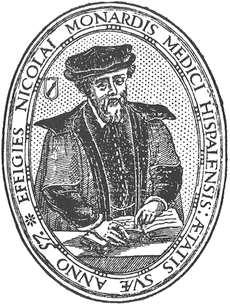Historia medicinal de las cosas que se traen de nuestras Indias Occidentales
Historia medicinal de las cosas que se traen de nuestras Indias Occidentales ("Medical study of the products imported from our West Indian possessions") is the standard title for a survey by Nicolás Monardes (1493–1588), Spanish physician and botanist. It appeared in successive editions under varying titles, gradually enlarged, in 1565, 1569 and 1574, followed by an unchanged reprint in 1580.

Nicolas Monardes at the age of 57, from the title page of the 1569 edition
Publication details
The full titles and publication details are:
- 1565: Dos libros ...
- 1569: Dos libros, el uno que trata de todas las cosas que se traen de nuestras Indias Occidentales, que sirven al uso de la medicina, y el otro que trata de la piedra bezaar, y de la yerva escuerçonera. Sevilla: Hernando Diaz
- 1574: Primera y segunda y tercera partes de la historia medicinal de las cosas que se traen de nuestras Indias Occidentales, que sirven en medicina; Tratado de la piedra bezaar, y dela yerva escuerçonera; Dialogo de las grandezas del hierro, y de sus virtudes medicinales; Tratado de la nieve, y del beuer frio. Sevilla: Alonso Escrivano
- 1580: Reprint of the 1574 publication. Sevilla: Fernando Diaz
English translation
An English translation, by John Frampton, appeared under the title Joyful News out of the New Found World. Publication details:
- 1577: Ioyfull newes out of the newe founde worlde, wherein is declared the rare and singular vertues of diuerse and sundrie hearbes, trees, oyles, plantes, and stones, with their applications, as well for phisicke as chirurgerie, translated from the 1565 Spanish edition. London
- 1580: a new edition enlarged on the basis of the 1574 Spanish edition. London
- 1925: Joyfull newes out of the newe founde worlde (cover title: Frampton's Monardes), edited by Stephen Gaselee, combining material from the 1577 and 1580 editions. London
Latin translation
A Latin translation, abridged, with editorial commentary, was made by Charles de l'Écluse (Carolus Clusius). Publication details:
- 1574: De simplicibus medicamentis ex occidentali India delatis quorum in medicina usus est. Antwerp: Plantin
- 1579: Simplicium medicamentorum ex novo orbe delatorum, quorum in medicina usus est, historia: revised with further commentary. Antwerp: Plantin
- 1582: Revised and included in a compendium of translations from Garcia de Orta, Nicolás Monardes and Cristóbal Acosta
- 1593: Further revised edition of this compendium
- 1605: Last revision, with further commentary and illustrations, included in: Carolus Clusius, Exoticorum libri decem
gollark: What's a rnd(x)?
gollark: Useful, no?
gollark: `print("print(%s" % "print('%s')") `
gollark: Do so, lyric ly.
gollark: You fix them.
References
- Boxer, C. R. (1963), Two pioneers of tropical medicine: Garcia d'Orta and Nicolás Monardes, London: Wellcome Historical Medical Library
- Dalby, Andrew (2000), Dangerous Tastes: the story of spices, London: British Museum Press, ISBN 0-7141-2720-5, pp. 14, 15, 154, 160
External links
- Ioyfull newes out of the newfound world (Londres: 1580) digitized by the John Carter Brown Library
- Ioyfull newes out of the new-found vvorlde (Londres: 1596) digitized by the John Carter Brown Library
- Online copy of the book's Englished edition at Early English Books Online (access for institutional subscribers only)
This article is issued from Wikipedia. The text is licensed under Creative Commons - Attribution - Sharealike. Additional terms may apply for the media files.